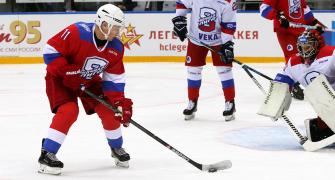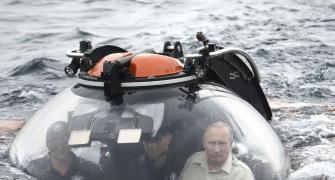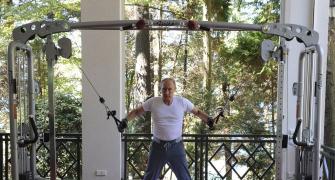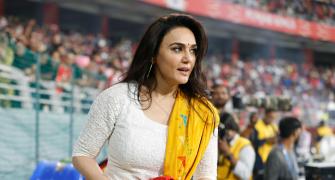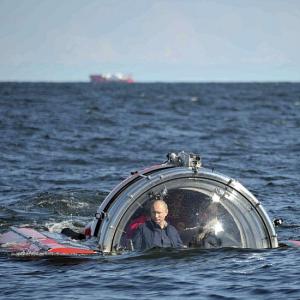'Like everyone else addicted to Kremlin politics, I too have a thesis.'
'Foreign policy is known to be Putin's forte -- and Russia's stability his obsession.'
'As we enter the 2020s, it is clear that an extraordinary turbulent decade lies ahead in world politics and it casts dark shadows on Russia's future,' notes Ambassador M K Bhadrakumar.

What happened in the Russian parliament on March 10 wore the look of a pantomime, but took everyone by surprise.
President Vladimir Putin made a surprise visit to the Russian Duma and in his very presence, a constitutional amendment (external link) was mooted which was passed on the same day which limits the presidential terms to two, but allows the incumbent to start from a clean slate and have two more terms.
The logic is, as Valentina Tereshkova, the iconic first woman in space who at 83 has become a lawmaker, put it, while proposing the constitutional change that gives Putin, if he so wishes, two more 6-year terms as president: 'Ordinary people simply asked for it. They asked [that Putin remained president even beyond 2024 when his present terms ends].'
This amendment becomes part of the earlier package of amendments that will be put before the electorate for a vote on April 22 for approval.
If it gets approval and becomes law, it is conceivable that Putin remains in power till 2036.
Of course, the high drama drew derisive criticism in the West from those who wouldn't miss an opportunity to demonise Putin, and even some Russian commentators feel embarrassed and angry.
Alexander Bauvnov at the Carnegie Moscow Center is absolutely certain that the 'Tereshkova Amendment' has been a carefully choreographed plan that carried Putin's imprimatur.
He wrote (external link), 'One thing is clear. The new decision changes the face of the Russian regime. The era of dissembling is over.'
'The leitmotif of the first period of Putin's rule was that Russia was still a rules-based European country... A new Russia is taking shape which is more disdainful of democracy... Undemocratic but stable China is now openly deemed a more powerful model than Europe. In this different global context, Putin has seen a chance to distance himself still further from Europe.'
The independent daily Novaya Gazeta was even harsher in its denunciation: 'It was obvious to any person with a functioning brain that Putin would never leave power.'
'This was the reason for the amendments to the constitution: it wasn't for the sake of the amendments themselves, which they drafted just to create discussion, but for the sake of the possibility of canceling the presidential term [limits].'
However, when it comes to the enigma that is Putin, there is always more than a single way of fathoming his inscrutable mind.
For a start, the option for Putin to remain president for two more terms does not necessarily mean that he will actually run in 2024 when his present term ends.
Conceivably, Putin is making sure that the aura of power envelops him all the way up to 2024 and he won't face the ignominy of being a 'lame duck' for the remaining 4-year period of the present term.
Having said that, Putin is a master tactician who keeps his options open, retaining the maximum freedom of political maneuver and wields the maximum power in his own hands.
He will keep folks guessing how exactly he will use this godly power to navigate his own future plans.
If Putin does remain in power till 2036, he is still short of the record of Peter the Great ruled Russia for 42 years, but he catches up with Ivan the Terrible who also had a 36-year term as tsar and would outstrip Catherine the Great (34 years) and, indeed, Josef Stalin himself (29 years.)
It is impossible to figure out whether Tereshkova was put up to it -- or Putin was blindsided by her proposal.
After all, Putin could as well have included this latest amendment in the package of measures already outlined in January.
The intriguing part is that Putin himself has been signalling oft and on through the past several weeks that he planned to leave the Kremlin in 2024.
Although Putin's personal popularity remains at about 68 percent, according to the most recent independent survey of pollster the Levada Center, Russians have also made it clear in other polls that they are ready for a change at the end of his current two terms in office in 2024.
According to Levada, 44 percent of voters want Putin to quit in 2024, while 45 percent believe he should stay.
And Putin is known to be highly sensitive to public opinion.
Like everyone else addicted to Kremlin politics, I too have a thesis.
Foreign policy is known to be Putin's forte -- and Russia's stability his obsession.
No doubt, Putin lifted Russia from its knees and is a man of history.
But, as we enter the 2020s, it is clear that an extraordinary turbulent decade lies ahead in world politics and it casts dark shadows on Russia's future course.
The US is once again on the prowl destabilising unfriendly governments abroad, many of them Russia's partners.
The worsening US-China relations have deep and far-reaching implications for Russia's 'pivot' to China.
Meanwhile, Qassem Soleimani's assassination in January was a shocking event for Moscow.
It was Soleimani, reportedly, who on a visit to Moscow in mid-2015 convinced the Kremlin about the imperative need of Russian military intervention in Syria to salvage the Assad government which was with its back against the wall.
Contrary to the general impression, the Russian position on the ground in Syria has become vulnerable.
There are incipient signs that the US is striving to set a bear trap in Syria.
Equally, US interference in Ukraine continues.
Not only are there are no prospects of a US-Russia detente or a lifting of Western sanctions against Russia, arms control talks remain elusive.
Worse still, the Deep State in America has succeeded in institutionalising anti-Russian policies, no matter who wins the presidential election in November.
In such an increasingly unstable and dangerous world beyond Russia's borders, Putin would have rethought his own position.
Aleksey Mukhin, the head of Moscow's Centre for Political Information, put it this way: 'It's a very delicate trolling of our Western partners. [Putin has] left [the option to run again] open for himself so that our Western partners remain on their toes.'
'It's a very slick move, which will cause a strong negative reaction that will, however, be absolutely in vain.'
Indeed, if the impression gains ground that Putin is quitting, there would be high probability of US interference in Russian domestic politics to ensure that his successor in the 2024 is a 'Westernist' -- preferably, in the Boris Yeltsin mould.
Whereas, the 'Tereshkova Amendment' signals far and wide that all options are on Putin's table.
The crux of the matter is that the US has 'relentlessly interfered in Russia's internal affairs' through the past century, as the noted American academic, author and journalist Stephen Kinzer wrote recently (external link) in a fascinating piece dwelling on the 'centenary' of the execution of Alexander Kolchak by the Bolsheviks, the White Russian admiral whom the Americans had hand-picked and promoted as Vladimir Lenin's replacement in the Kremlin.
Ambassador M K Bhadrakumar served the Indian Foreign Service for more than 29 years. He has served as India's ambassador to Turkey and Uzbekistan and has been a contributor to Rediff.com for well over a decade.

